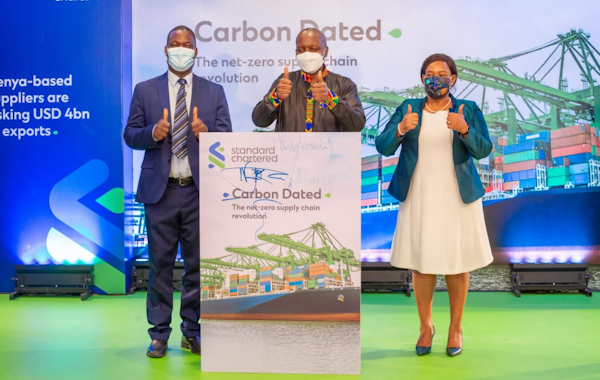Standard Chartered Bank Kenya seeks to push the climate change agenda by committing to reduce carbon emissions by approximately 400 tons by the end of 2023.
According to its 2021 Sustainability Impact Report, keeping with its brand promise to be a responsible company, StanChart has taken a bold stance toward achieving Net Zero emissions from its operations by 2025 and its financing activities by 2050 using renewable energy sources.
The report highlights its sustainability initiatives, achievements, and progress made in 2021. It presents an overview of the bank’s efforts in accelerating the stewardship of the net zero, widening economic participation, and addressing the growing imbalances brought about by globalization.
With these sustainability pillars, the report further cements StanChart’s efforts in building a trusted brand by providing world-class products and services, promoting sustainability and support for the community.
The shift toward sustainability was necessitated by Kenya’s rapid industrialization and position as a regional economic hub, and the global commitment toward the Sustainable Development Goals (SDGs). There is an increased need for infrastructure, water, energy, and economic opportunities, particularly in the country’s cities.
According to Moody’s Investors Service Report, 2019, Kenya’s infrastructure deficit requires close to 4 billion US Dollars to keep abreast with the demand of over 50 million people. Similarly, the Covid-19 pandemic dented the SME sector, with many Kenyans reduced to doing menial jobs in unproductive sectors.
Consequently, the country’s provision of electricity increasing by over 40 percent over the last two decades is insufficient to meet increased demand. This is against the backdrop of a global shift to cleaner energy sources.
These economic, environmental, and social challenges require robust and sustainable solutions. As a banking sector entity, StanChart believes that sustainable finance plays a crucial role in addressing scarcities in employment, natural resources, and infrastructure and in enabling small and medium-sized businesses to create jobs, especially for marginalized groups such as women and youth.
On StanChart’s commitment to sustainable development, the Impact Report shows that the bank’s decision to channel funds into high-impact areas is gradually paying off – especially in addressing Kenya’s environmental and infrastructural challenges.
The bank has set high sustainability standards across its initiatives and products to ensure that challenges such as easy access to clean water, sanitation, and green energy are solved.
Statistics show that over 40 percent of Kenyans cannot access clean drinking water, and a further 70 percent of the population requires access to improved sanitation facilities. As such, StanChart partnered with Davis & Shirtliff, regional water, an energy company, in 2020 to provide clients with access to critical water infrastructure, including solar water heaters and water treatment solutions.
Through this partnership, StanChart is directly contributing to the provision and purification of water for drinking and sanitation use, easing the burden on already strained natural resources in Kenya.
In 2021, the bank disbursed 23.1 million shillings (compared to 59.1 million in 2020) for solar water heaters and water treatment solutions to 889 clients, creating estimated economic returns of up to 92.4 million shillings.
During the review period, the bank continued its ongoing support in financing affordable clean energy. A total of 7.3 billion shillings (compared to 7.7 million in 2020) was spent in 2021 to finance renewable energy projects in the country.
This StanChart financing has enhanced the ability of clients to invest in clean energy sources such as on-grid photovoltaic power generators, including solar panels, which feature low installation and energy costs and low maintenance inputs.
In 2021, it reduced its energy usage by 20.1 percent, down from 154kWh in 2020 to 123kWh. Similarly, the bank reduced its water usage by 38 percent, from 0.16 kiloliters in 2020 to 0.1 in 2021. This reduced water costs by a whopping 54 percent, from 1.8 million to 0.8 million shillings.
Over the past four years, StanChart has reduced its annual average water usage by 82 percent, thanks to the restoration of the wastewater treatment plant at the bank’s Head Office. The bank has ensured that wastewater is recycled for reuse in the washrooms, has installed water blades in the bathrooms to minimize wastage, installed drinking water filtration systems at all sites, and the restoration of the stormwater tank in the Head Office at Chiromo.
The 2021 Sustainability Impact Report reveals that the Standard Chartered Bank Kenya reduced its waste production by 24.3 percent, from 321 tons in 2020 to 243 tons in 2021. This was achieved by reusing and recycling materials, thanks to its strategy of leveraging the potential of digital solutions by moving away from waste-generative practices such as extensive paper usage.
StanChart’s Impact Report also shows that the bank has recorded a significant decrease in its carbon footprint over the last reporting cycle. The reduction is party contributed to the bank’s strategy of:
- conducting environmental assessments when lending to clients
- assessing a potential client’s carbon footprint both at the time of lending and due to potential future activities; and
- restricting clients from using thermal coal and promoting the use of renewable energy sources.
Going forward, the bank is looking to focus on positively impacting high carbon-intensive sectors, continuing to leverage its relationship with clients and sector partners to reduce and manage its collective carbon footprint to sustainable levels.
“We are participating in accelerating to net zero in our communities through partnerships, creating awareness for colleagues, communities and engaging like-minded stakeholders in the fight to mitigate the impact of climate change thereby putting the world on a sustainable path to net zero by 2050,” Kariuki Ngari, Chief Executive Officer says.
For instance, in 2021, they signed a three-year partnership with the Nairobi Arboretum Conservancy Community Forest Association (NACCFA) to rehabilitate The Nairobi Arboretum Park and promote urban green spaces through the restoration of running paths, support education, and create awareness on conservation of the environment in the community.
Khusoko is on Telegram. Click here to join our channel and stay updated with the latest Company business news and updates.




